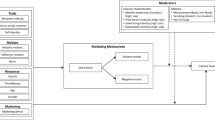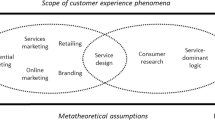Abstract
Batra et al. (Journal of Marketing 76, 1–16, 2012) created a new conceptualization of brand love but did not develop a pragmatically useful measure for studies where questionnaire length is a constraint. The current research develops a more parsimonious brand love scale, with three nested versions of 26, 13, and 6 items, respectively. This research also validates the scales, and in so doing conducts several important validity tests not considered by Batra et al. The 26-item scale is able to predict consumer loyalty, word of mouth, and resistance to negative information, with an R 2 of .90, after correcting for measurement error.

Similar content being viewed by others
Notes
Similar to the findings above with respect to tests of construct validity, attitude strength #2 was not significantly correlated with the other 13 brand love factors and does not appear to be part of the brand love construct in the minds of respondents in these data. Hence, we did not investigate further the mean differences on attitude strength 2.
As found for the analysis of the American Eagle data, the attitude strength #2 items correlated poorly with the other 13 factors: the range of correlations was −0.18 to 0.29. Therefore, attitude strength #2 (confidence/certainty) again was a poor indicator of brand love but was included within this MTMM analysis, for completeness and comparison to BAB.
These correlation matrices are available from the authors on request.
References
Aaker, J. L. (1997). Dimensions of brand personality. Journal of Marketing Research, 34(3), 347.
Aggarwal, P., & McGill, A. L. (2007). Is that car smiling at me? Schema congruity as a basis for evaluating anthropomorphized products. Journal of Consumer Research, 34(4), 468.
Ahuvia, A. C. (1992). For the love of money: materialism and product love. In F. Rudman & M. L. Richins (Eds.), Meaning, measure, and morality of materialism (pp. 188–198). Provo, UT: The Association for Consumer Research.
Ahuvia, A. C. (1993). I love it! Towards a unifying theory of love across diverse love objects. PhD Dissertation, Northwestern University, Ann Arbor, MI: UMI Dissertation Services.
Ahuvia, A. C. (2005). Beyond the extended self: loved objects and consumers’ identity narratives. Journal of Consumer Research, 32(1), 171–184.
Ahuvia, A. C. (2015). Nothing matters more to people than people: brand meaning, brand love and social relationships. Review of Marketing Research special issue on Brand Meaning Management, 12, 121–149.
Ahuvia, A. C., Bagozzi, R. P., & Batra, R. (2014). Psychometric vs. C-OAR-SE measures of brand love: a reply to Rossiter. Marketing Letters, 25(2), 235–243.
Batra, R., Ahuvia, A. C., & Bagozzi, R. P. (2012). Brand love. Journal of Marketing, 76, 1–16.
Bergkvist, L., & Tino, B.-L. (2010). Two studies of consequences and actionable antecedents of brand love. Journal of Brand Management, 17(7), 504–518.
Carroll, B. A., & Ahuvia, A. C. (2006). Some antecedents and outcomes of brand love. Marketing Letters, 17(2), 79–89.
Escalas, J. E., & Bettman, J. R. (2013). Self-construal, reference groups, and brand meaning. Journal of Consumer Research, 32(3), 378–389.
Fournier, S. (1998). Consumers and their brands: developing relationship theory in consumer research. Journal of Consumer Research, 24(4), 343–373.
Hayes, A.F. (2013). Introduction to mediation, moderation, and conditional process analysis: A regression regressionbased approach. New York: Guilford.
Pieters, R. (2013). Bidirectional dynamics of materialism and loneliness: not just a vicious cycle. Journal of Consumer Research, 40(4), 615–631.
Rauschnabel, P. A., & Ahuvia, A. C. (2014). You’re so loveable: anthropomorphism and brand love. Journal of Brand Management, 21(5), 372–395.
Rauschnabel, P., Ahuviam A. C., Ivens, B. S. and Leischnig, A. (2015). The personality of brand lovers: an examination in fashion branding. In: Consumer Brand Relationships: Meaning, Measuring, Managing. M. Fetscherin and T. Heilmann, (eds.), Pelgrave.
Richins, M. L. (1997). Measuring emotions in the consumption experience. Journal of Consumer Research, 24(2), 127–146.
Romaniuk, J. (2013). What’s (brand) love got to do with it? International Journal of Market Research, 55(2), 185–186.
Shimp, T. A., & Madden, T. J. (1988). Consumer-object relations: a conceptual framework based analogously on Stemberg’ s triangular theory of love. Advances in Consumer Research, 15, 163–168.
Thomson, M., MacInnis, D. J., & Park, C. W. (2005). The ties that bind: measuring the strength of consumers’ emotional attachments to brands. Journal of Consumer Psychology, 15(1), 77–91.
Zarantonello, L., Romani, S., Grappi, S., & Bagozzi, R. P. (2016). Brand hate. Journal of Product & Brand Management, 25(1), 11–25.
Acknowledgments
The authors would like to thank two anonymous reviewers and the area editor for comments and suggestions made on the research.
Author information
Authors and Affiliations
Corresponding author
Additional information
The order of authors is random. Each contributed equally to the research.
Rights and permissions
About this article
Cite this article
Bagozzi, R.P., Batra, R. & Ahuvia, A. Brand love: development and validation of a practical scale. Mark Lett 28, 1–14 (2017). https://doi.org/10.1007/s11002-016-9406-1
Published:
Issue Date:
DOI: https://doi.org/10.1007/s11002-016-9406-1




